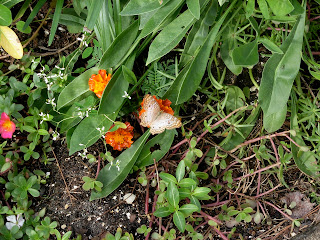When
Is It Okay to Settle for Less?
Even Monarchs Sometimes Refuse a Flower
 |
| Migrating Monarchs loved the fall-blooming asters in my Massachusetts garden. |
I
don’t often see Monarch butterflies in my Florida flowerbeds, so when one
visited last week, I noticed. Lone traveler that it was, I figured it was
migrating a bit late from the northern climes in search of warmth and flowers,
which were abundant in my yard that day. I watched and waited for the butterfly
to light on a flower and replenish its supply of nectar before fluttering off
to Mexico or maybe even Miami. It kind of had that “just passing through” aura
about it. More than that, it almost seemed agitated, like a weary, wary traveler
who has stopped at the first available rest stop, thrown the car into park, and
run to the restroom before getting back on the highway and driving another 100
miles.
Unlike
such a traveler who might be content to sling back a cup of coffee or
caffeinated beverage to assist in completing his or her journey, the Monarch
was having none of this fast-food business of drinking what was available and
then dashing on its way. It had a certain drink in mind.
 |
| Desert Rose was a non-choice for the Monarch. Sweet enough for the Fritillary, but it didn't make the cut for the Monarch. |
 |
| Gerbera Daisies thrill most gardeners and flower shop patrons, but the Monarch was blind to their charms. |
My
flowerbeds have flowers—lots of flowers—so I was perplexed as I watched the
Monarch flit from flower to flower, yet only hover and not stop. Marigolds? Uh,
uh. Heliotrope? Nope. Periwinkle? Not having it. Gerbera daisies? No way.
Mexican petunia? No. Salvia? Guess again. Porterweed—a choice of coral or
lavender? Not quite. Lantana? That’s a city. Buttercups? Yes, yes, and yes,
but, and a huge but it was, Buttercups bloom only until about midday, and
because Ms. Monarch was visiting late in the afternoon, the Buttercup blossoms
were all closed. Again and again, Ms. Monarch fluttered down to the closed
buds, lifted gracefully in flight, fluttered down again, and lifted again. Ms.
Monarch flew about the other flowers and in a spirit of disdain, ignored them
and continued to scan the Buttercups, only to find each bud closed tight, its
nectar unavailable.
 |
| Had the Monarch come earlier in the day, this Buttercup would have been open and nectar filled. |
The
more Ms. Monarch attempted to sip the Buttercup nectar, the more annoyed she
seemed to become. Her flight became impatient as she flew close to the other—unwanted—flowers,
and then again tried the unavailable Buttercup buds. I could almost sense a
tantrum coming on and wondered to myself, “Now what would a butterfly tantrum
look like?”
After
a few more frustrated attempts at the buttercups, Ms. Monarch fluttered south across
the yard and away—maybe Miami or Mexico might have what she wants.
As
I watched the lone Monarch make its way to parts unknown, I thought about “knowing.”
That butterfly knew what it wanted. That butterfly was certain what it wanted.
That butterfly wanted Buttercup nectar and only Buttercup nectar and refused to
settle for less. In my opinion, Gerbera daisies, marigolds, Mexican petunias,
and especially heliotrope are far from “less,” lovely flowers that they are,
but that didn’t matter to the Monarch. Painted Lady and Fritillary butterflies
are thrilled with my other flowers, as are the bees, but Ms. Monarch wasn’t
having any of them.
 |
| This Fritillary loves the marigolds, unlike the Monarch, who wanted only Buttercups. |
Ms.
Monarch did not settle for less than what she wanted. I believe in compromise
for certain, but watching Ms. Monarch helped me stop for a few minutes, and
consider what it’s like to not settle for less so often. What it’s like to know
what I want and to go for it. There’s a lesson in the refusal of the Monarch.
In a culture where so much is available, it’s easy to take coffee from the
vending machine when we want a clear, cold glass of water. It’s easy to accept
little when we deserve so much. It’s easy to drink the nectar of the marigold
when we really want a buttercup.
In
what ways can I, can you, today and every day, look at the choices we have in
front of us and decide whether we’re going to take what’s there just because it
is there, or whether we’re going to
search for the Buttercup?
No comments:
Post a Comment